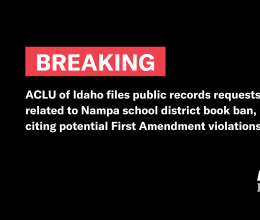
Ruling Mandates Important Protections for Due Process Rights of Idahoans with Developmental Disabilities
BOISE, Idaho – Idaho’s Chief Federal Judge B. Lynn Winmill has ordered the Idaho Department of Health and Welfare to develop substantial additional safeguards to protect Idaho Medicaid participants. The decision comes as the latest ACLU of Idaho victory in the K.W. v. Armstrong class action. The lawsuit, over Idaho’s Medicaid programs for adults with developmental disabilities, contended that the Idaho Department of Health and Welfare cut Medicaid participants’ assistance without adequate notification or procedural protections. The federal court agreed this week, holding that the Idaho Department of Health and Welfare “arbitrarily deprives participants of their property rights and hence violates due process.”
“This case defends basic, fundamental constitutional rights for some of Idaho’s most vulnerable,” Leo Morales, ACLU of Idaho Executive Director, explained. “It should not have taken a four year, federal class action to vindicate these essential rights, but the ACLU of Idaho is proud to have had the privilege of representing adults with developmental disabilities, who are such an important part of our Idaho communities.”
The decision follows a long-standing injunction that has restored about $30 million of Medicaid assistance in Idaho annually. The federal Ninth Circuit Court of Appeals upheld that injunction in 2015. Before the lawsuit was filed, the Department of Health and Welfare refused to disclose the reasons for cutting individuals’ Medicaid assistance, claiming its decision-making formulas were “trade secrets” and the formula used to calculate the benefits was not available to the public. The ACLU of Idaho, representing a class of about 4,000 Idahoans in the Medicaid programs at issue, has “prevailed at every turn,” the federal court remarked in its latest decision, despite that “IDHW has fought plaintiffs on every issue.”
The court’s decision orders specific remedies, requiring IDHW to develop a plan to ensure that all of the participants have people to help them in getting all assistance they are entitled to, mandating that IDHW to identify the standards it uses to make assistance determinations, and ordering testing to ensure the reliability and accuracy of IDHW’s automated systems.
The decision will require IDHW to propose further plans for compliance for court approval. Richard Eppink, Legal Director of the ACLU of Idaho and one of the plaintiffs’ attorneys in the case, remarked that “the amount of trouble Idaho’s government has gone through to avoid its constitutional responsibilities in this case is staggering. Let’s hope that this decision will turn its focus from fighting against constitutional protections and toward embracing them.” James Piotrowski, another of the plaintiffs’ attorneys, added: This case demonstrates that constitutional rights are critical to improving the day to day lives of Idahoans.”
The case has been handled by the ACLU of Idaho and Mr. Piotrowski, of the law firm of Herzfeld & Piotrowski, LLP. The Idaho Attorney General’s office represents the government defendants.



